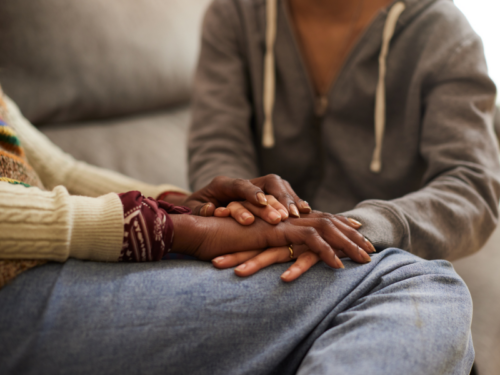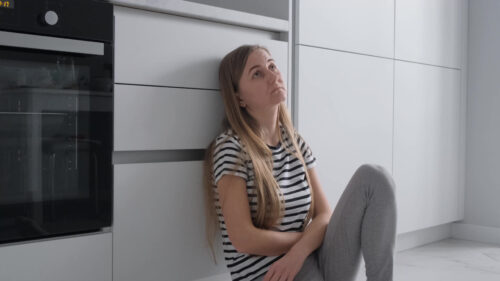Trauma Treatment for Teens and Adults
After surviving trauma, building connections and receiving trauma-informed care are critical for long-lasting healing. That’s why Charlie Health offers trauma-informed therapy in individual and group sessions. Fill out the short form below or call us directly to start healing from trauma today.
More than 91% of clients see improvements in their most severe mental health symptoms.
How are trauma-related conditions diagnosed?
Diagnosing trauma-related conditions typically involves a thorough clinical assessment conducted by a mental health professional. This process includes a detailed clinical interview about experiences and symptoms, followed by the application of diagnostic criteria outlined in manuals such as the Diagnostic and Statistical Manual of Mental Disorders (DSM-5). Standardized assessment tools and questionnaires may be used to gauge symptom severity, differentiate between disorders, and assess the impact of the trauma on the individual’s life. The clinician then makes a diagnosis and creates a treatment plan.
How does Charlie Health treat trauma?
For teens and adults who have survived trauma, building connections is critical. That’s why our Clinical Team takes a compassionate approach to teen and young adult trauma treatment.
Each client receives a personalized treatment plan that includes a specialized individual therapist, facilitated peer groups, and optional family therapy to help foster long-term healing.
We go beyond trauma-informed therapy. We treat trauma at its roots.

We proudly partner with many major insurance providers, including commercial, Medicaid, and TRICARE
What are the best types of therapy for trauma?
Dialectical behavior therapy (DBT) skills
Dialectical behavior therapy (DBT) skills benefit trauma survivors by helping them manage emotions and distress linked to traumatic experiences. These skills, including mindfulness, distress tolerance, and emotion regulation, help trauma survivors handle trauma triggers, reduce impulsive behaviors, and boost emotional well-being. DBT’s interpersonal effectiveness skills also assist in forming healthier relationships, crucial for trauma survivors as it fosters a supportive social environment and helps in the healing process.
Cognitive-behavioral therapy (CBT)
In cognitive-behavioral therapy (CBT), trauma survivors work with a therapist to change negative thought patterns related to their trauma, which can reduce emotional distress and anxiety. It also focuses on modifying behaviors developed in response to trauma, using exposure techniques to confront and process traumatic memories safely. Trauma-focused cognitive-behavioral therapy (TF-CBT), a specialized approach particularly for young people who have experienced trauma, combines CBT with trauma-sensitive techniques, helping trauma survivors process trauma, change distorted thoughts, and learn coping strategies.
Mindfulness-based therapy
Mindfulness-based therapy, such as mindfulness-based stress reduction (MBSR) or mindfulness-based cognitive therapy (MBCT), can help trauma survivors develop greater awareness of their emotions and bodily sensations. This awareness lets them better control their reactions to triggers. Mindfulness practices, such as meditation and deep breathing, keep trauma survivors present and reduce traumatic memories. These therapies also promote self-compassion and non-judgment, which is healing for those dealing with trauma-related guilt or self-blame.
How it works
Reach out
Call our Admissions Team 24/7 or fill out our quick online form to verify your insurance coverage and get started
Get matched
We’ll conduct a thorough assessment to create your personalized virtual treatment plan
Start healing
Meet your peers in groups and your primary therapist in as little as 24 hours
Mental health conditions associated with trauma
FAQs about trauma
See All FAQsWhat are the main signs of trauma?
- Re-experiencing the trauma through flashbacks and nightmares
- Feeling disconnected from oneself or outside of one’s body
- Avoiding triggers, including places or people that are reminders of the trauma
- Relationship issues, including social withdrawal or isolation
- Being on high alert and easily startled
- Mood swings, including anger outbursts
- Trouble focusing
- Unexplained aches and pain
- Sleep disturbances
What are the main types of trauma?
- Physical trauma: Bodily injuries or harm, often caused by accidents, falls, assaults, or medical procedures.
- Emotional trauma: The emotional or psychological impact of distressing events or experiences.
- Sexual trauma: Experiences of sexual assault, rape, sexual abuse, or harassment.
- Childhood trauma: Traumatic events or adverse experiences happen during a person’s formative years.
- Complex trauma: Exposure to multiple traumatic events, often over an extended period.
- Acute trauma: Typically the result of a single, severe traumatic event, such as a car accident, natural disaster, or an act of violence.
- Chronic trauma: Prolonged exposure to distressing or harmful situations.
- Community or collective trauma: Trauma affecting entire communities or groups of people often related to large-scale events, such as natural disasters, acts of terrorism, or war.
- Vicarious trauma: Trauma experienced by people who are indirectly exposed to traumatic events, often through their work, such as healthcare professionals, first responders, or journalists.
What are the four trauma responses?
- Fight: Fight is a response in which an individual confronts a threat or stressor head-on, seeking to overcome or resist it.
- Flight: Flight is a response characterized by the instinct to escape or avoid a perceived threat or dangerous situation.
- Freeze, or flop: Freeze is a response involving immobility and an inability to react when faced with overwhelming stress, often as a result of fear or shock.
- Fawn: Fawn is a response in which a person seeks to appease or please others, even at their own expense, as a way to avoid conflict or harm in social situations.
What causes trauma?
Trauma can result from a wide range of distressing experiences or events that overwhelm an individual’s ability to cope and process the emotional impact. These events often involve a threat to one’s life or safety, physical or emotional abuse, violence, accidents, natural disasters, or the loss of a loved one. Trauma can also be rooted in adverse childhood experiences, such as neglect, chronic stress, or dysfunctional family environments. The severity and lasting effects of trauma can vary from person to person, with factors like resilience, support systems, and prior experiences influencing how individuals respond to and recover from traumatic events.
*Analysis based on self-reported outcomes data from routinely discharged clients (Jan-June 2024) who had severe anxiety or moderately severe to severe depression at intake, and improvements at discharge.



























































